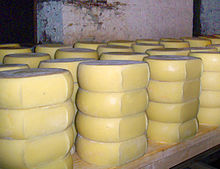Kashkawal
Kaschkawal , Kashkaval or Kačkavalj is a straw-colored cheese made from sheep's milk or cow's milk that is produced in the Balkans and Turkey . However, the word is also often used for all types of yellow cheese. The name is possibly a corruption of the Italian cheese Caciocavallo , or vice versa, Caciocavallo could have originated from Kaschkaval through folk etymology .
In Bulgaria was Kaschkawal ( Bulgarian кашкавал ) to 1990 practically the only cheeses. In addition, there was only the siren ( Сирене ) called brine cheese as well as processed cheese and smoked cheese in stores . At that time, Bulgarians perceived the common European cheeses as slightly salty and bitter, as the familiar Kashkawal does not contain these flavor components. Kaschkawal is a very mature cheese ( hard cheese ) that has a slightly inhomogeneous, crumbly structure on the tongue and is similar in taste to Italian pecorino cheese . It is usually not consumed as a semi-hard cheese because it is difficult to cut into thin slices and it is traditionally eaten in larger pieces. A typical preparation for the warm kitchen is the Greek saganaki like "Breaded cheese" for which the Kaschkawal is thickly sliced and fried (Bulgarian: "Кашкавал пане" - breaded cheese ).
In the former Yugoslavia the cheese is called Kačkavalj and is made from both sheep and cow's milk. These is Pirotski kačkavalj, ( Пиротски качкаваљ. ) Of Serbia and the Korab from Northern Macedonia .
In Romania as Cascaval cheeses referred to include, in addition Kaschkawal other varieties of sliced cheese .
See also
Web links
swell
- History and production of the Bulgarian Kashkawal at www.kaesewelten.info, accessed on June 19, 2016
- "Teubner Food - The Whole World of Groceries", p. 181 f., Gräfe & Unzer, Munich 2011
